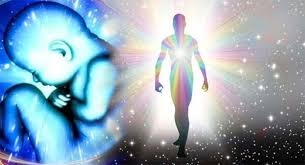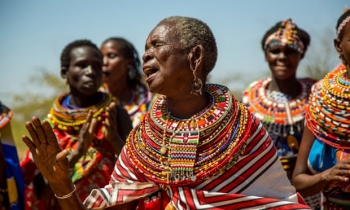profile/626IMG-20200707-WA0025.jpg
Ellaella

ILO UWA/INO UWA Igbo Afterlife
~3.3 mins read
The reality of the afterlife has always been an issue shrouded in mystery from the beginning of time, the Igbo people of South-east Nigeria are known for their many life-centered beliefs, they are people of spirituality which is not excluded in their belief of life and death. They say a cat has nine lives, Igbos say Humans have seven lives.
Life, according to the Igbo culture, is a series of coming and going till the person exhausts his/her life cycle they call it ILO-UWA which literally means Return to the world, in English REINCARNATION. They believe in the world beyond which they call ALA-MMUO, which is where they believe the soul and spirit of every human returns to after the death of the flesh.
From the birth of a child to death, every life process is revered and considered sacred, as a rite of passage to and fro the other world, just as depicted in prolific writer Chinua Achebe’s book Things Fall Apart:
Ezeudu! He called in his guttural voice. If you had been poor in your last life I would have asked you to be rich when you come again. But you were rich. If you had been a coward, I would have asked you to bring courage. But you were a fearless warrior. If you had died young, I would have asked you to get life. But you lived long. So I shall ask you to come again the way you came before (Achebe; 1958:98)
Ilo uwa is an Igbo belief in reincarnation, Reincarnation is the philosophical or religious belief that the non-physical essence of a living being starts a new life in a different physical form or body after biological death. It is also called rebirth or transmigration.
However, the Igbo reincarnation is believed to occur within the immediate or extended family and always in the human physical form. In the Igbo cycle of life, each human has a total of seven lives before final resting in the ancestral home, hence, the Igbo phrase Uwam uwa Asaa. The cycle number of a person is unknown to them whilst alive.
The Igbo beliefs in Ilo-uwa vary from person to person, some believe that a person reincarnates in the exact body features and all, while some believe that the body lies in grave and rot while soul and spirit reincarnate. It is usually said that sometimes before an individual’s death, he notifies the family who he/she will be coming back as. Sometimes, a body mark or scare gives the clue or behaviors exhibited by the child which further strengthens their belief.
Every event from the birth of a child is symbolic in the rites of passage in the cyclic life, from the welcoming ceremony where a Dibia Afa is consulted to know who reincarnated which will determine the name given to the child as the wrong name can result in the death of that child.
The occurrence of a child prodigy is called, “Ebibi-ụwaâ€, in Igbo language, meaning Nature’s imprint. Those born with their pre-incarnation intellectual and physical abilities are seen as yet another proof for the Igbos belief in reincarnation.
It is sometimes said that a soul or person can reincarnate in several individuals, maybe to accomplish a goal. According to a traditional herbalist, she is a reincarnate of her great-grandmother, a great herbalist who died in her primetime. The great-grandmother had two other living reincarnates from the extended family, none of them heeded her call to tow her path in practicing traditional medicine except for Ebele. This goes to affirm the saying about existing in multiple bodies for them. They all have a mortal bond binding them and if one should die, it could affect all of them especially if they see the body.
Even with the influence of Christianity in Igbo cultures today, the belief in Ilo-uwa is still strong with efforts to integrate it into their present lives. It can be seen in the names given to their children, these are a true indication of the Igbos belief in reincarnation. Nna-nna (the father of his father); Nne-nna (the mother of his father); Nne-ji (my brother or sister); Nna-ji (my half brother/half-sister); and Nwa-nne Daa (the brother or sister of my mother). None of these names is repeated in the family because they specify the ancestors. Relations in this life pay the child the same high respect they were accustomed to paying to the deceased grandparent or relation of their father. Some people in Igboland are bearing their pre-incarnation names and enjoying the high level of respect due to a grandfather /mother.
profile/626IMG-20200707-WA0025.jpg
Ellaella

See Tribe Where Women Give Birth To Babies Without A Man
~2.6 mins read
It will surprise you that women in Umoja have been surviving without men. The inhabitants of Umoja have been thriving in the single-gender community. There are currently 47 women and 200 children in Umoja.
Although the inhabitants live extremely frugally, these enterprising women and girls earn a regular income that provides food, clothing and shelter for all. Village leaders run a campsite, a kilometre away by the river, where groups of safari tourists stay. Many of these tourists, and others passing through nearby nature reserves, also visit Umoja.
The women charge a modest entrance fee and hope that once in the village, the visitors will buy jewellery made by the women in the craft centre. Goats and chickens wander around, avoiding the bamboo mats on which women sit making jewellery to sell to tourists, their fingers working quickly as they talk and laugh with each other.
There are clothes drying in the midday sun on top of the huts made from cow dung, bamboo and twigs. The silence is broken by birdsong, shrill, sudden and glorious. It is a typical Samburu village except for one thing: no men live here.
Women wear traditional Samburu dress of patterned skirts, brightly coloured shirts and kanga (a colourful wrap) tied on their shoulders. Necklaces made of strings of vividly coloured beads form stunning circular patterns around their necks.
The colourful clothing contrasts with the dry air and terrain, and the harsh sun that picks out the dust that fills the air.
The village was founded in 1990 by a group of 15 women who were survivors of rape by local British soldiers. Umoja’s population has now expanded to include any women escaping child marriage, FGM (female genital mutilation), domestic violence and rape – all of which are cultural norms among the Samburu. Rebecca Lolosoli is the founder of Umoja and the village matriarch.
She was in the hospital recovering from a beating by a group of men when she came up with the idea of a women-only community.
The beating was an attempt to teach her a lesson for daring to speak to women in her village about their rights. The Samburu are closely related to the Maasai tribe, speaking a similar language.
They usually live in groups of five to 10 families and are semi-nomadic pastoralists. Their culture is deeply patriarchal. At village meetings, men sit in an inner circle to discuss important village issues, while the women sit on the outside, only occasionally allowed to express an opinion.
Umoja’s first members all came from the isolated Samburu villages dotted across the Rift valley. Since then, women and girls who hear of the refuge come and learn how to trade, raise their children and live without fear of male violence and discrimination.
One of the unique features of the Umoja community is that some of the more experienced residents train and educate women and girls from surrounding Samburu villages on issues such as early marriage and FGM.
Ornate beaded jewellery is an important accoutrement of Samburu culture. Girls get their first necklaces from their father in a ceremony known as “beadingâ€.
The father chooses an older “warrior†male with which the daughter will enter into a temporary marriage at this time. Pregnancy is forbidden, but contraceptives are unavailable. If the child becomes pregnant, she is forced into an abortion, conducted by other women in the village.
“If a girl is married at an early age, that girl will not be a competent parent. Giving birth they face a lot of challenges: they rupture,
Advertisement

Link socials
Matches
Loading...
